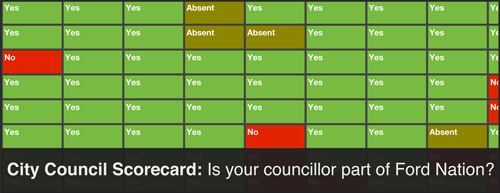June 20, 2011 Update: Download (PDF) – Download (PNG) – Google Docs
Last week’s council meeting was light on major decisions, as some of the hyped-up media items (shark fin soup and a second NHL team, for example) were deferred without much debate. The only new addition to this month’s City Council Scorecard is the item regarding the sale of 22 TCHC homes.
New Votes
- EX6.5 — As written, this vote referred only to the sale of 22 single-family homes owned by the TCHC, located mostly in downtown wards. Several of the houses are currently vacant, waiting very costly repairs. There was a lot of discussion as to how many of the homes listed are actually eligible for sale under various provincial and municipal regulations. Regardless, the debate council had on this item was only nominally about the listed homes. (Council has often sold TCHC properties in the past. Here’s an example from last summer.) Opposition councillors seemed more concerned with the precedent set by the sale — especially considering Case Ootes’ recommendation to sell another 900 homes — and the belief amongst Ford-allied councillors that selling properties represents a scaleable solution to Toronto’s housing problem. As such, even after speaking at length with concerns about the sale, several left-wing councillors — including Kristyn Wong-Tam, Sarah Doucette, John Filion and Glenn de Baearemaeker — ultimately supported the sale. Notably, Councillor Adam Vaughan drew some flack from the mayor’s team for sitting out the vote in protest.
Trend Watch
I didn’t deem it notable enough to include in the Scorecard, but a vote on an amendment moved by Councillor Raymond Cho on the same item was interesting. Defeated on a tie vote of 22-22, the amendment would “[urge]Â the Federal and Provincial governments to immediately fund an ongoing and sustainable social housing renovation and repair program so that social housing repair needs in Toronto are met and the backlog eliminiated. [sic]”
In other words: tell the provincial and federal governments that they’ve kind of screwed us over with this downloading-of-responsibilities thing.
Voting for it included the left-wing of council (minus Shelley Carroll, who missed the meeting due to an out-of-town funeral, and — oddly — Maria Augimeri), the ‘middle’ group of councillors, and Gloria Lindsay Luby and James Pasternak.
Questions
Questions about the Council Scorecard? Read my notes on methodology. Also, you can email me.

